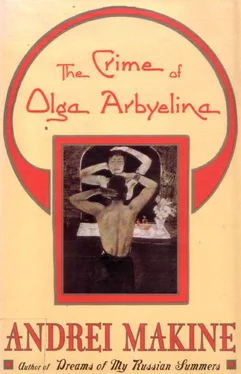With a final effort at sane reasoning she formulated this eerie and incongruous thought and rejoiced in its absurdity: "There was no dragon!" That was it, she needed to speak of improbable things that had no chance of becoming real. No dragon! An unknown apartment, that man in the armchair, perhaps. But no dragon. Like that she would finally manage to distinguish the true from the false…
This exercise seemed to calm her. A respite of several minutes during which she got up, went into the book room, took down a fat encyclopedic volume, leafed through it with a clumsy, nervous hand. And quickly hit upon the engraving: "A boa constrictor attacking an antelope." The glistening body, covered in arabesques, was strangling its victim. "The dragon…," she whispered and recalled that, in the vast apartment she had just left, she had forgotten to switch off the lamp on the bedside table.
The sounds coming through the heat haze were blurred, liquid. The cries of children paddling at the edge of the river, the lowing of a herd… And the lazy plashing of oars. To push the boat clear from the low, muddy bank just now he had had to take off his shoes, roll up his pants, and step into the water. Now she could see the broad, hardened soles of his feet. And on his forehead the smear of clay he had left when wiping away drops of sweat. For her this brown streak was a particularly odd source of distress in this world of sunlight and apathy. She could not say to him, "You've made a mark on your face," still less could she dip her fingers into the water and wash his brow for him…
That would have been quite unthinkable. The man sitting facing her, his bare heels wedged against the timbers of the boat, was an utterly strange being: a man who desired her and who was taking her out in a boat on a stifling July day, fulfilling a ritual that was a prelude to the night, when he would violate her as much as he desired, as of right, without any resistance on her part. Before their boat trip, as they walked through the upper town, he had invited her into the shooting gallery. He had not missed a single target; as he walked out he had looked at her with the air of a child expecting praise… This was the very man who had materialized in a labyrinthine apartment in the armchair facing the wall, the man spying on them with a smile of connivance. She recalled the great bed, the sheets with their scent of the river, yes, precisely the same smell as this tepid water rippling beneath the low sides of the dinghy. Under this watchful gaze she and the boy, whose body was still wet, had tried to mask their love. Yes, they were searching in all innocence for some object lost among the folds of the devastated bed. But while going through the motions of this search they were embracing, exchanging kisses, giving themselves to each other…
She forced herself to listen. Golets had just spoken to her. Doubtless it was his "We really must make hay while the sun shines: because you never know," that he kept repeating every five minutes. The smear of clay on his forehead was drawing out into a long, sinuous trickle. "If only I could ask him: that apartment, that simulated search in a disordered bed-were they real?" said a hopeless voice within her. It was the "little bitch," she recognized it almost joyfully, for these words were the only ones that still linked her to this day, to this man's conversation, to life… She leaned forward, thrust her hand into the water. She was going to wash away the muddy mark on his forehead…
At that moment they touched land. Golets jumped onto the bank and drew the bow of the vessel into a little gap between the willows in the middle of the tangle of weeds. Then he helped her to step ashore and settled her in a little clearing surrounded by bushes. He did it with the care you would have for an important patient; or for a vase filled with water with a bunch of flowers in it, that you dread breaking just at the last moment. Or perhaps (the voice of the "little bitch" pierced the silence that enveloped her) yes, especially, for a person whose social standing made this riverside picnic somewhat inappropriate. "The Princess Arbyelina," the voice whispered. "That is what you still are to him. He is still susceptible to your body's added value."
Golets spread out a tablecloth and set down the bottle. From his bag he took two glasses, some bread, and a packet covered in grease stains. "Princess Arbyelina," she thought, picturing the life where the word had a meaning, where the people lived who knew her. The Caravanserai, Villiers, Paris… This world now seemed to her non-existent, beheld in a dream long since dissipated. Now there was only the damp sauna of this July afternoon, the sweetish smell of the tepid, muddy water; this woman half reclining in the grass, with a glass in her hand that she raised to her lips from time to time, yielding to the pleas of a man who talked incessantly. A man who, when night came, would crush her breasts, penetrate her, fall asleep beside her. He already had all these actions imprinted in him, in his forearms, blue with their thick veins, in his fingers with broad, yellow nails…
"And to think that last winter all this was under the snow!"
He was stretched out, his elbow planted in the earth, his legs crossed, and, without letting go of his glass, he extended his arm, indicating the fields beyond the river. She closed her eyes and signaled to him to say nothing more. A fragile night was forming within her in which she walked along, recognizing, with mournful felicity, a branch crystallized in the hoarfrost; a little frozen pond; but, above all, a floral tapestry of ice on a dark windowpane…
It was Golets who roused her from her reverie. He must have thought her closed eyes-she had covered them with her hand to shut out the light more completely-were a sign of drunkenness. Without getting up he executed a rapid crawl and got behind her. He took her by the shoulders, tilted her toward him, slipped a hand beneath her back. When he met her suddenly opened eyes he froze: a glassy stare that expressed nothing, did not see him, saw nothing… Detaching himself from her, he emitted, in spite of himself, a sort of moan of thwarted pleasure, almost a meowing. She got up, stared at the man crouching at her feet, then lifted her eyes toward the roofs of the upper town where they climbed up the hill, toward the flat curve of the river… So after all, there was nothing in the warm, soft stuff of life but this whine of desire; this flesh forever hungering for fusion.
He picked up the remains of the meal, folded the tablecloth. And it was then that there was this moment of hesitation: should he throw away the almost empty bottle or take it with him? Already visibly drunk, he was brought up short by this ridiculous indecision. He stuffed the bottle into his bag, took it out again, examined it, perplexed… These few seconds of uncertainty (she later felt it that way but no one chose to believe her) marked the start of that ticking away of minutes that preceded the end. If he had not delayed, turning the bottle over and over, if they had left a little sooner, or if he had ended up keeping the bottle, everything would have turned out differently. But he swung his arm, essaying a jocular war whoop, and threw the bottle into the water.
But with the intuition of drunken men, he must have felt as if there were a taut cord linking him to something invisible. His mood changed. He tried to joke. Now they were drifting downstream. Several yards farther on they caught up with the bottle that had not sunk; he gave it a poke with an oar, the neck disappeared, releasing a brief gurgling of air bubbles. He roared with laughter. And at once became somber again.
It was no doubt in order to cast off this obscure uneasiness that he suddenly abandoned the oars, stretched himself, raising his face toward the sky, and declared in a voice slurred by drunkenness, "Man is made for pleasure as birds are made for flight."
Читать дальше












